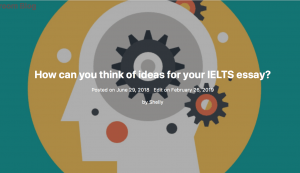
IELTS Cause Effect essays: Stop exaggerating your arguments
A lot of IELTS teachers tell students that their “ideas don’t matter”, but this is simply NOT true. Yes, you are free to agree or disagree with any question (so there is no “right” opinion) but if you need a high IELTS score, then it is extremely important that your ideas are both relevant and convincing. In this week’s blog, I want to show you how to drastically improve the quality of the arguments in your essay by giving ideas that are less dramatic, which can be a real problem in IELTS Cause Effect essays in particular!
IELTS ideas that are relevant and convincing
I expect most of you know that “relevant” just means having ideas that address the question, but what does “convincing” mean? Well, it means having arguments that make the examiner nod his or her head in agreement because they are REALISTIC. The mistake that students make again and again is giving arguments that are just too DRAMATIC (and, therefore, not convincing at all).

Often, this is because students try to give BIG reasons for trends, rather than focusing on more subtle explanations. As I said, this is usually a problem in IELTS Cause Effect Essays. Take this question for example:
In many countries, the tradition of having family meals together is disappearing.
Why is this happening?
What will the effects of this be on the family and society?
Most students are able to cope with the first question fairly well. Why are people eating together less? Often I am given these very good arguments:
- In most households today, both parents work and simply do not have enough time to prepare a meal that can be eaten around a table. 👏👏👏
- People tend to eat more often outside the home i.e. children eat at school / parents in a canteen 👍👍👍
- Children take part in after school activities and so coordinating one meal that can be eaten by everybody at the same time is hard. 👌👌👌
Great – all of these arguments are relevant and convincing i.e. I accept that these are REAL reasons for this trend. The problems start when students have to think of the effects of this problem. Most are able to see that not eating as a family can have a negative impact on family structures. However, when it comes to explaining what that negative effect is, almost all students come up with EXTREME arguments:
- Children of families who do not eat together turn to crime and often commit murder. – REALLY? 😳😳😳
- Children from families that have disintegrated usually end up being drug addicts. – REALLY? 🤔🤔🤔
- Parents who do not eat together get divorced. – REALLY? 🤯🤯🤯
These are real arguments given by my students in recent weeks but, I want you to ask yourself, ARE THESE TRUE? Do you really think that the main reason for youth crime is not having a family meal? Or that children who eat in front of the TV always become addicted to drugs? Or that the divorce rate is affected by a lack of family meals? I don’t! I think that these are over-simplified arguments that are far too extreme to be convincing (and therefore won’t score more than a 6.0 for Task Response).
The really sad thing here is that these students are actually on the right path to a good idea – they have just gone way too far. All they need to do is bring their arguments one or two steps back to something more realistic and widely accepted. To do this, ask yourself “why” you think these arguments are true:
- Why do children “commit crimes”? Well, probably because they weren’t supervised closely enough by their parents and so problems weren’t spotted.
- Why do people get divorced? It is probably because they don’t spend enough quality time with each other and so start to drift apart.
- Do you see? Once we move a step back from the DRAMATIC ideas of crime and divorce and start digging a bit deeper into why these problems could come about, we actually arrive at some very good more subtle arguments. Let’s turn these ideas into a paragraph:
Unfortunately, this trend can lead to a number of negative outcomes. Firstly, when families sit down and eat together every day, it is easy for the parents to see subtle changes in their children’s behaviour that could be warning signs of an underlying problem. For example, they might be experiencing some difficulties at school such as bullying, or they may have fallen out with friends. Once family members eat separately, the opportunity for daily observation is lost and, as a result, younger family members’ problems can go unrecognised. Over time, this can lead to them becoming depressed or acting out in other ways, which could affect their schoolwork or their ability to interact with others in society in general. In the same way, if the adult members of the family both work long hours, then a shared meal might be the only time that they have to really connect each day. Thus, not having this meal can result in them becoming distanced. In the worst cases, this might lead to the breakdown of communication and even, eventually, in divorce.
Can you see the difference? I have taken the same ideas (crime and divorce) but have developed them in a much more realistic and convincing way! Notice that I have kept “divorce”, but I have shown that it is the final worst case scenario rather than the inevitable end. Honestly, I still think that this argument is a bit too dramatic, but at least now it is more convincing as I have given a REASON for this idea.
So, if you are struggling for ideas for your IELTS Cause Effect Essays, my advice is don’t fall back on EXTREME arguments to support your ideas. Try to take a step back and offer the examiner an opinion that is more reasoned and less dramatic. If you can do this, you will be far more likely to get a 7.0 or even an 8.0 or 9.0 for Task Response.
If you have been thinking about joining one of my writing courses then why not stop thinking and start learning! There are 40 hours of lessons with high-quality advice like this to ensure your success in your IELTS journey. 
Plus, the lessons are interactive, so you will pause and participate in every lesson. But that’s not the best part! Once you become my student, you will be able to message me with any questions you have at any time, so you won’t be on the IELTS journey on your own anymore! And, every writing package now includes access to our free daily live lessons for reading, speaking, and listening. 🚀
